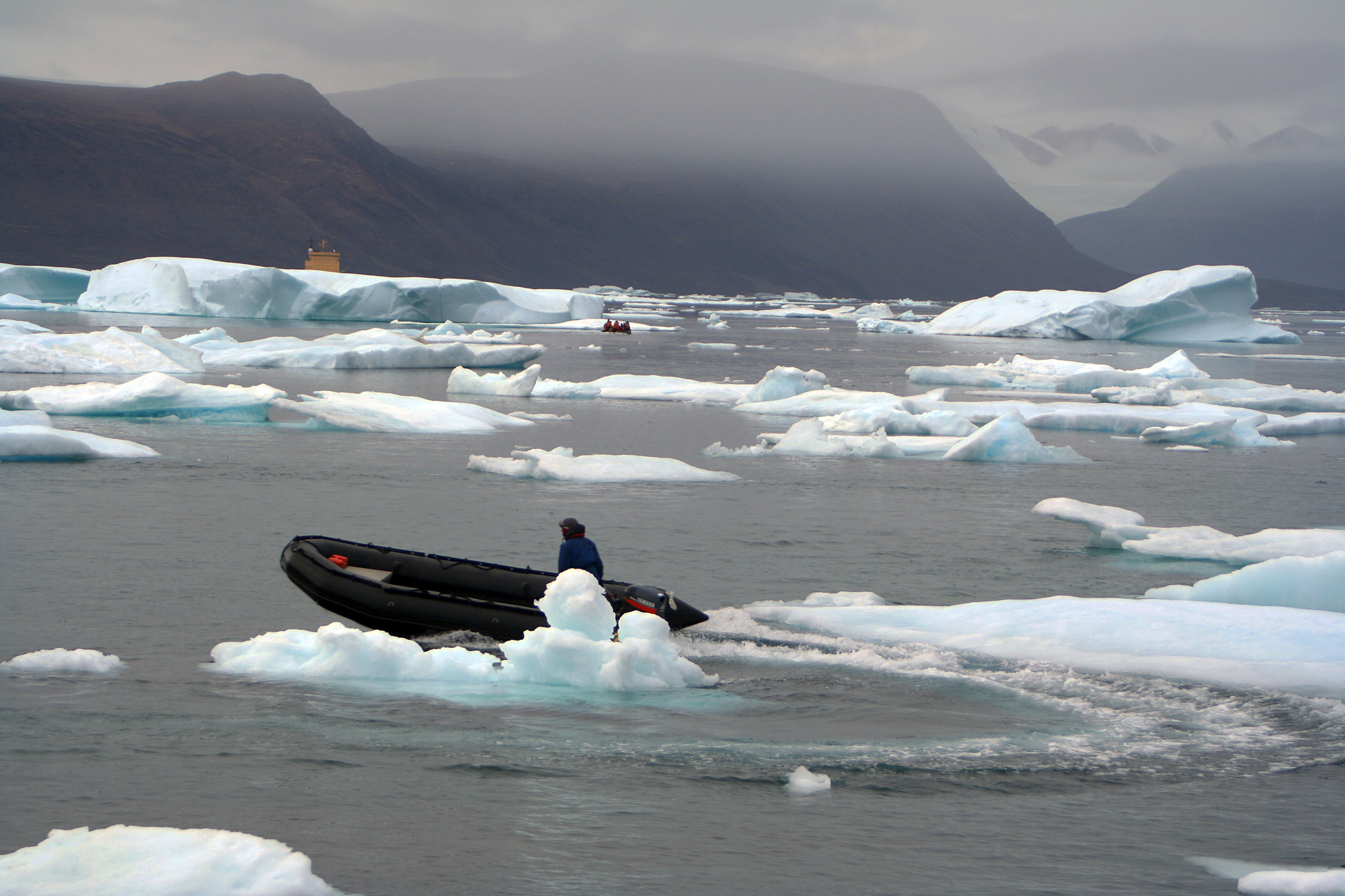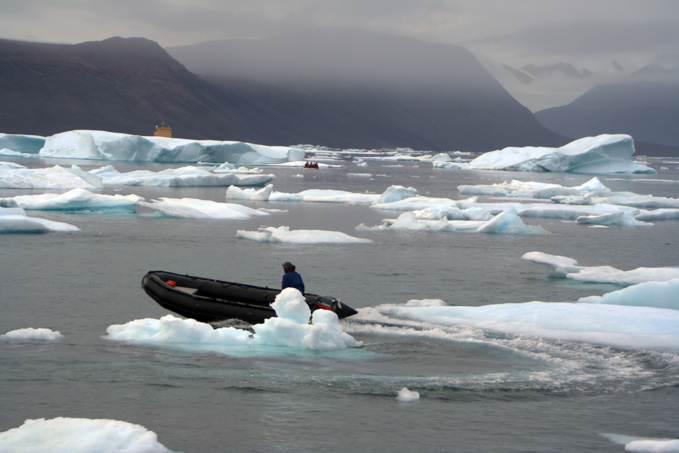China
The People's Republic of China wants to take full advantage of the Arctic. This desire even overlaps the restrained character of the Chinese diplomacy. The Northern Sea Route, the shortest commercial sea line for delivering goods from Asia to Europe is of greatest interest to China now. According to the International Energy Agency’s forecasts, this economy will become the largest importer of oil in the world in 2020. Already now the PRC is the most significant international carrier in the Northern Sea Route and is actively building its own icebreakers.
In 2025, according to the Chinese authorities, the country intends to transport 20% of its foreign trade cargo through this transport highway. However, so far, apart from the statements, China has not taken any real steps to develop the Arctic transit.
The second reason for Beijing’s increased interest in the Arctic is the fact that the state is experiencing an acute shortage of natural resources. Thus, parallels with the struggle for the Far East and Africa, rich in deposits, look quite obvious. The PRC seeks to gain access to minerals using serious financial assistance in the development of deposits. By investing in such projects, the PRC finds an opportunity to take part in the extraction of natural resources in these zones.
South Korea
Modern experts often see the Republic of Korea as an economic twin of China. Their interests are similar in the matter of conquering the Arctic. Following the PRC, the country received permanent observer status in the Arctic Council, is already building its first icebreaker and even approved a program of actions to implement the National Arctic Policy.
The difference between the South Korean and the Chinese strategies is only how exactly priorities are declared. So, the adopted document emphases economic possibilities of servicing the Northern Sea Route, not trade through it. To this end, the program of action, first of all, inscribed the need "to continue the development of building polar ships, including icebreakers, and to create its own icebreaker fleet and become the world's recognized exporter of ice-class vessels on the basis of this". This position, according to the authorities of South Korea, will help the country expand its presence in the Arctic Council from a permanent observer to a full member by the end of the 2020s. And this will give the Asian state absolute access to international projects of scientific and economic development of the Arctic: exploration and production of minerals, free passage through the Northern Sea Route, attraction of its clients in commercial sea transportation.
If Korea achieves equality in activities in the arctic zone, both institutionalized and informal, Seoul can count on strengthening its traditional priorities in the international economy. Particularly, this is about interstate cooperation in development of new logistics and transport routes, transport of goods and development of port infrastructure. Representatives of South Korea, of course, understand that they may face obstacles that will be exposed to them by circumpolar countries. Therefore, today the country is actively seeking support from non-Arctic states, primarily China and Japan.
Japan
Japan also tries to have a finger in the Arctic pie. Unlike its Asian counterparts, Tokyo's politicians do not allow themselves to talk about the possibility of independent mining or the management of maritime trade routes. Japan is trying to strengthen its role as a consultant on scientific technologies and a supplier of equipment or a consumer of resources and services from the Arctic. This guarantees a strong position for future presence in the Arctic waters, projects on studying the shelves of the Arctic Ocean, as well as participation in the development of new solutions in the regulation of navigation in the region.
To this end, Japan is currently preparing ports, to which and from which goods will be delivered through the Northern Sea Route, building icebreakers and training young specialists in the Arctic. This, among other things, will allow the country to strengthen its position in the Arctic Council and, on an equal basis with representatives of the Arctic and Near Arctic states, make decisions regarding the policy of developing the region.
source: reuters.com
The People's Republic of China wants to take full advantage of the Arctic. This desire even overlaps the restrained character of the Chinese diplomacy. The Northern Sea Route, the shortest commercial sea line for delivering goods from Asia to Europe is of greatest interest to China now. According to the International Energy Agency’s forecasts, this economy will become the largest importer of oil in the world in 2020. Already now the PRC is the most significant international carrier in the Northern Sea Route and is actively building its own icebreakers.
In 2025, according to the Chinese authorities, the country intends to transport 20% of its foreign trade cargo through this transport highway. However, so far, apart from the statements, China has not taken any real steps to develop the Arctic transit.
The second reason for Beijing’s increased interest in the Arctic is the fact that the state is experiencing an acute shortage of natural resources. Thus, parallels with the struggle for the Far East and Africa, rich in deposits, look quite obvious. The PRC seeks to gain access to minerals using serious financial assistance in the development of deposits. By investing in such projects, the PRC finds an opportunity to take part in the extraction of natural resources in these zones.
South Korea
Modern experts often see the Republic of Korea as an economic twin of China. Their interests are similar in the matter of conquering the Arctic. Following the PRC, the country received permanent observer status in the Arctic Council, is already building its first icebreaker and even approved a program of actions to implement the National Arctic Policy.
The difference between the South Korean and the Chinese strategies is only how exactly priorities are declared. So, the adopted document emphases economic possibilities of servicing the Northern Sea Route, not trade through it. To this end, the program of action, first of all, inscribed the need "to continue the development of building polar ships, including icebreakers, and to create its own icebreaker fleet and become the world's recognized exporter of ice-class vessels on the basis of this". This position, according to the authorities of South Korea, will help the country expand its presence in the Arctic Council from a permanent observer to a full member by the end of the 2020s. And this will give the Asian state absolute access to international projects of scientific and economic development of the Arctic: exploration and production of minerals, free passage through the Northern Sea Route, attraction of its clients in commercial sea transportation.
If Korea achieves equality in activities in the arctic zone, both institutionalized and informal, Seoul can count on strengthening its traditional priorities in the international economy. Particularly, this is about interstate cooperation in development of new logistics and transport routes, transport of goods and development of port infrastructure. Representatives of South Korea, of course, understand that they may face obstacles that will be exposed to them by circumpolar countries. Therefore, today the country is actively seeking support from non-Arctic states, primarily China and Japan.
Japan
Japan also tries to have a finger in the Arctic pie. Unlike its Asian counterparts, Tokyo's politicians do not allow themselves to talk about the possibility of independent mining or the management of maritime trade routes. Japan is trying to strengthen its role as a consultant on scientific technologies and a supplier of equipment or a consumer of resources and services from the Arctic. This guarantees a strong position for future presence in the Arctic waters, projects on studying the shelves of the Arctic Ocean, as well as participation in the development of new solutions in the regulation of navigation in the region.
To this end, Japan is currently preparing ports, to which and from which goods will be delivered through the Northern Sea Route, building icebreakers and training young specialists in the Arctic. This, among other things, will allow the country to strengthen its position in the Arctic Council and, on an equal basis with representatives of the Arctic and Near Arctic states, make decisions regarding the policy of developing the region.
source: reuters.com



















